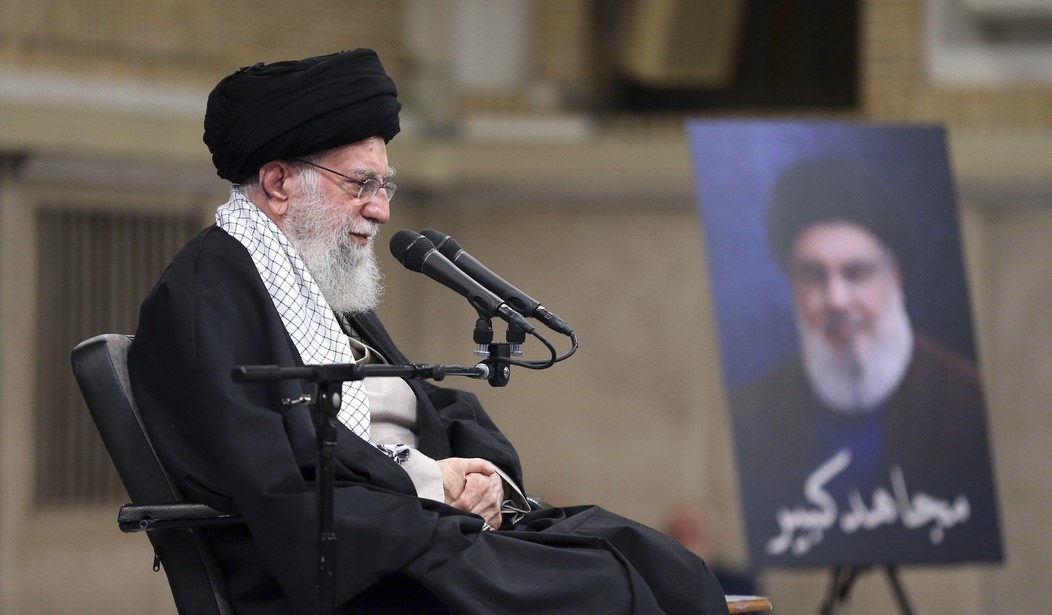It’s been a bad stretch for the Iranian regime. Back in April, the former Deputy Speaker of the Iranian Parliament, Ali Motahhari, said in an interview that has caused uproar in Iran, that from the start of its nuclear program, the theocratic regime had striven to produce nuclear weapons. He continued: “At the beginning, when we launched the nuclear program, our aim was to develop the bomb and improve our deterrent power”. Motahhari then quoted parts of the Quran’s Surah al Anfal (60): “And prepare against them whatever you are able of power and of steeds of war by which you may terrify the enemy of Allah and your enemy. However, we failed to keep it a secret, and our confidential reports were revealed by the exiled opposition organization Mujahedin-e Khalq (MEK)”. This revelatory admission put the final seal on the mullahs' attempts to renew their nuclear ambitions following the pummeling their clandestine sites received during the 12-day war with Israel and America in June.
So, on July 28, the U.K., France and Germany, known collectively as the E3, triggered the ‘snapback mechanism’ by co-signing a letter to the UN Security Council. The Snapback Mechanism was a key part of the UN Security Council’s Joint Comprehensive Plan of Action (JCPOA) nuclear deal implemented by Barack Obama and the E3 nations, together with Russia, China, the U.S. and the E.U. in 2015. President Trump unilaterally withdrew America from the deal during his first presidency in 2018, declaring it “the worst deal in American history.” However, the E3 nations continued to seek ways of persuading the Iranian regime to comply with tough restrictions on its uranium enrichment program, in exchange for a major alleviation of sanctions. After 10 years of wrangling, with the mullahs playing a cat and mouse game with the West, while accelerating its secret program to develop a nuclear weapon, the E3 nations finally concluded that the Iranian regime was in breach of all its JCPOA undertakings. They wrote to the UN Security Council asking them to trigger the Snapback Mechanism and effectively reintroduce maximum pressure sanctions on the regime in 30-days-time – October 1.
The likelihood that the sanctions will be reimposed have further shattered the Iranian currency – the rial, which was trading at 940,00 to $1 in late July. It has now fallen to over 1,030,000 rials to the $1. When the mullahs hijacked the popular revolution in 1979, seizing power from the deposed and hated Shah, the rial was trading at 74 rials to the $1. Now Iranians almost require a wheelbarrow filled with banknotes to purchase a loaf of bread. The 12-day war between Israel, Iran and the U.S. in June pummeled the theocratic regime’s nuclear sites, killing dozens of senior Islamic Revolutionary Guard Corps (IRGC) commanders and many nuclear scientists. It also exposed the weakness and vulnerability of Iran’s defenses. On top of the fall of the mullahs’ key ally Bashar al-Assad in Syria and the decapitation of Hezbollah in Lebanon and Hamas in Gaza, the regime was already at its lowest ebb. Renewed hard-hitting sanctions may be the final straw for 90 million impoverished Iranians.
Recommended
But further blows were to rain down on the mullahs at the end of July. In Canberra, the Australian Prime Minister Anthony Albanese announced that he had expelled the Iranian Ambassador and all of his diplomats and he had also closed the Australian Embassy in Tehran. He declared on TV that the Australian Security & Intelligence Organization (Asio), had uncovered evidence directly linking the Iranian government to antisemitic arson attacks on a kosher restaurant in Sydney and a synagogue in Melbourne in 2024. The Australian PM said the Iranians had paid local gangsters to carry out the attacks in a bid to distance themselves from any accusations of involvement, but the evidence pointed to the unequivocal involvement of the IRCG in the operation. The expulsion of the Iranian diplomats is the first time Australia has carried out such an eviction since World War II. Australia also joined the U.S. and Canada in blacklisting the IRGC as a foreign terrorist organization.
The long list of terrorist attacks, arson, bombings, murders and attempted assassinations that have taken place for decades in the E.U. and U.K. have led to repeated calls for the blacklisting of the IRGC. However, arch appeasers of the mullahs’ regime have dug their heels in, insisting that further dialogue and diplomatic relations could somehow achieve success. Indeed, Belgium and Sweden even agreed to release a convicted terrorist and a serial human rights abuser sentenced to 20 years and life imprisonment respectively, in exchange for Belgian and Swedish hostages arrested and charged with fake espionage offenses. The two convicted Iranian criminals returned to a hero’s welcome in Iran, while the mullahs' regime continued to export worldwide terror with impunity. Now that the U.K., France and Germany have finally woken up and triggered the Snapback Mechanism, surely the time has come for the E.U. and U.K. to blacklist the IRGC and indeed, to expel the Iranian regime’s diplomats and close our embassies in Tehran. We should follow Australia’s example. It must by now be obvious that the only way to restore freedom, justice and democracy to Iran, to the Middle East and to the world, is to overthrow the Iranian regime, not by appeasement, not by military intervention, but by the Iranian people themselves.
Editor’s Note: Do you enjoy Townhall’s conservative reporting that takes on the radical left and woke media? Support our work so that we can continue to bring you the truth.
Join Townhall VIP and use the promo code FIGHT to get 60% off your VIP membership!

























Join the conversation as a VIP Member